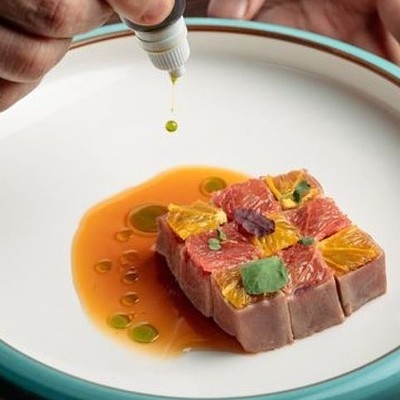There was a lot of positive response to a post from a few weeks ago, "Righting the Wrong of Rosé," and so I thought folks might enjoy hearing about the 1998 López de Heredia Viña Tondonia Rosado Gran Reserva (Grand Reserve Rosé), a true gem and one of the greatest and truly iconic wines of Spain.
Remember the patronizing slogan from the 1970s, "we will sell no wine before its time"? Well, here's a winery that actually doesn't sell its wines before their time. The historic López de Heredia winery in Rioja "raises" its wines in the cellar, waiting patiently to release them until the winemaker feels they have obtained the desired nuance and complexity. (The current release for this wine is actually 2000 but I had the good fortune to stumble upon a 1998 in Houston; see below.)
Made primarily from Garnacho (Garnacha or Grenache) with smaller amounts of Tempranillo and Viura (white) -- all grown in the estate's top vineyard, the Viña Tondonia -- the wine is vinified in what is called an "oxidative" style. Sometimes compared to Sherry in terms of its nutty overtones, the style is owed to the fact that the winemaker ages the wine for roughly four years in an oak cask, "racking" the wine twice a year. Racking means transferring the wine (which reduces in volume as it ages) from one cask to another. During this process, the wine gently "oxidizes" when it comes into contact with the air. Whereas most rosé wine is produced in a fresh, bright style and sent immediately to market, this oxidative style is intended to bring out the earthy flavors and minerality in the wine (and López de Heredia is not alone in producing rosé for long-term aging; Tempier and Terrebrune in Bandol are two of the most famous French counterparts).
The resulting wine achieves that magical balance between the sweetness of the fruit and the savoriness of the earth -- the yin and the yang, as it were, that causes wine to transcend its purpose on earth as a nutriment and accompaniment to food.
Tireless champion of Natural wine, Alice Feiring, devoted a chapter to López de Heredia in her book The Battle for Wine and Love: or How I Saved the World from Parkerization (Houghton Mifflin Harcourt, 2008). And Eric Asimov of The New York Times has also written famously about his "long love affair with the wines of López de Heredia." I also recommend taking a look at the winery's excellent English-language website.
The best news is that I picked up a bottle of this wine for less than $40 at The Houston Wine Merchant. And you should be able to find the 2000 Gran Reserva Rosado for about the same price at your favorite wine shop in town. (Look also for the 2000 Gravonia, a white.) Part of what makes these world-class wines so great is that we can afford to serve it at our house on a Saturday night with slow-cooker pulled pork (think spice and fat when pairing this favorite of ours).
Follow Eating Our Words on Facebook and on Twitter @EatingOurWords






